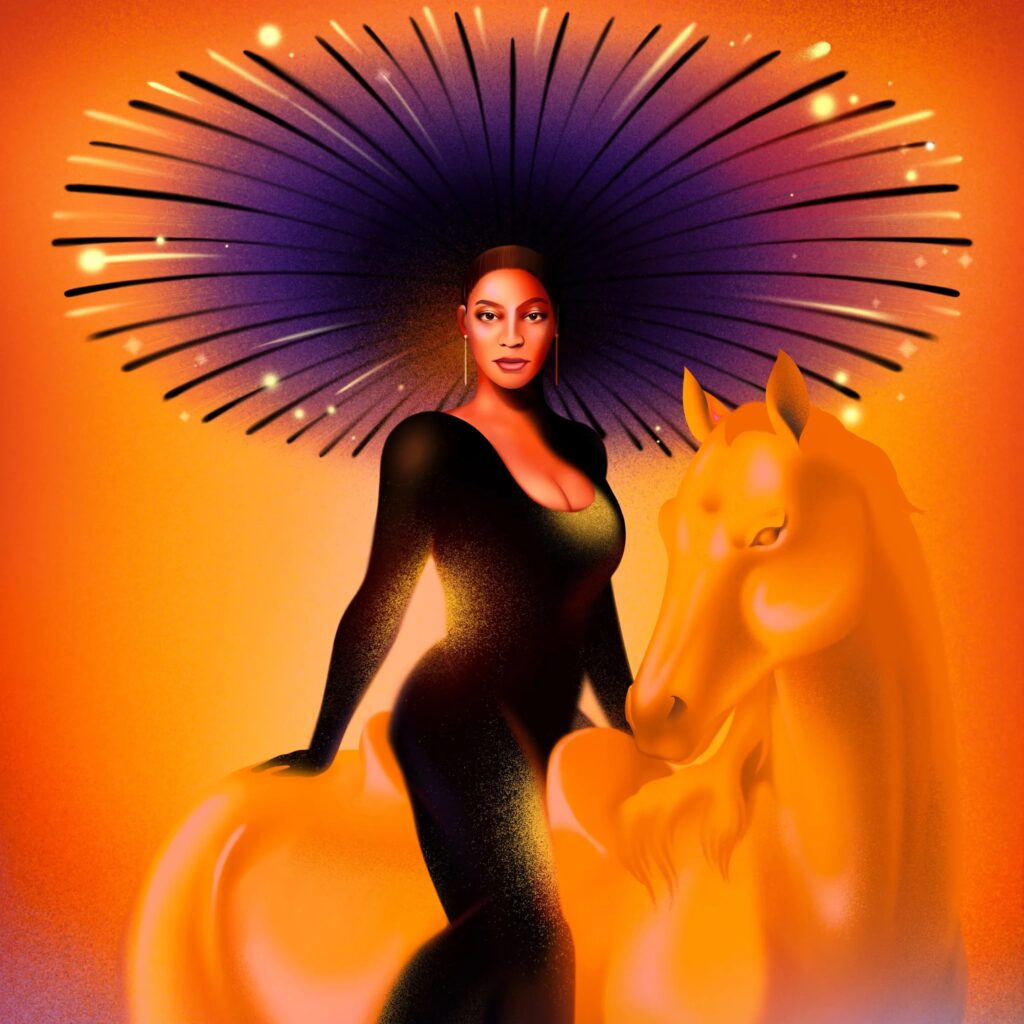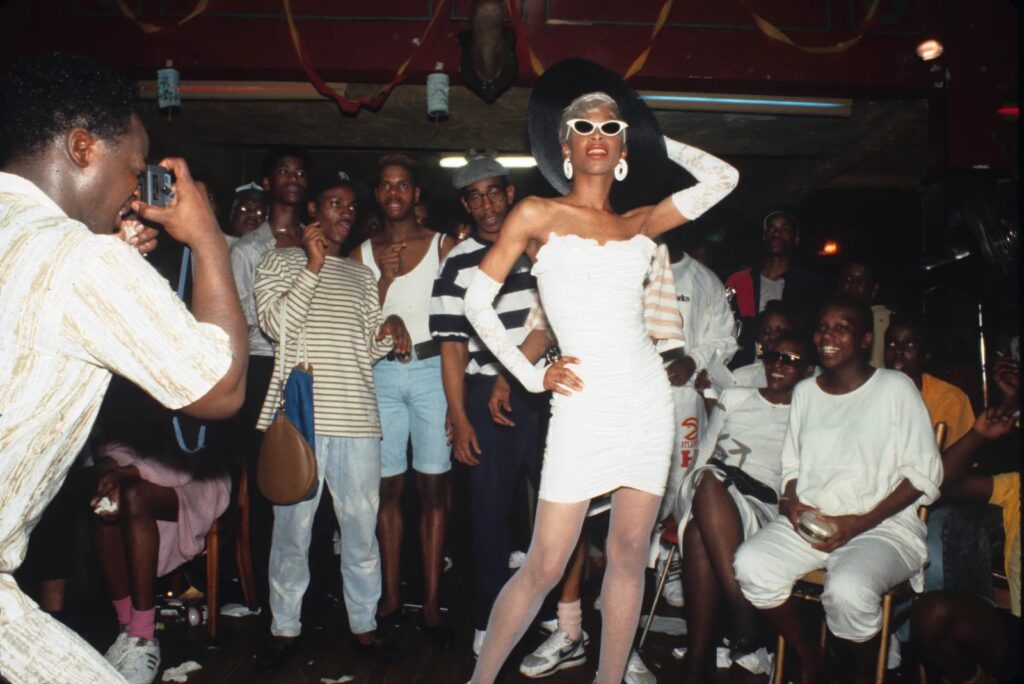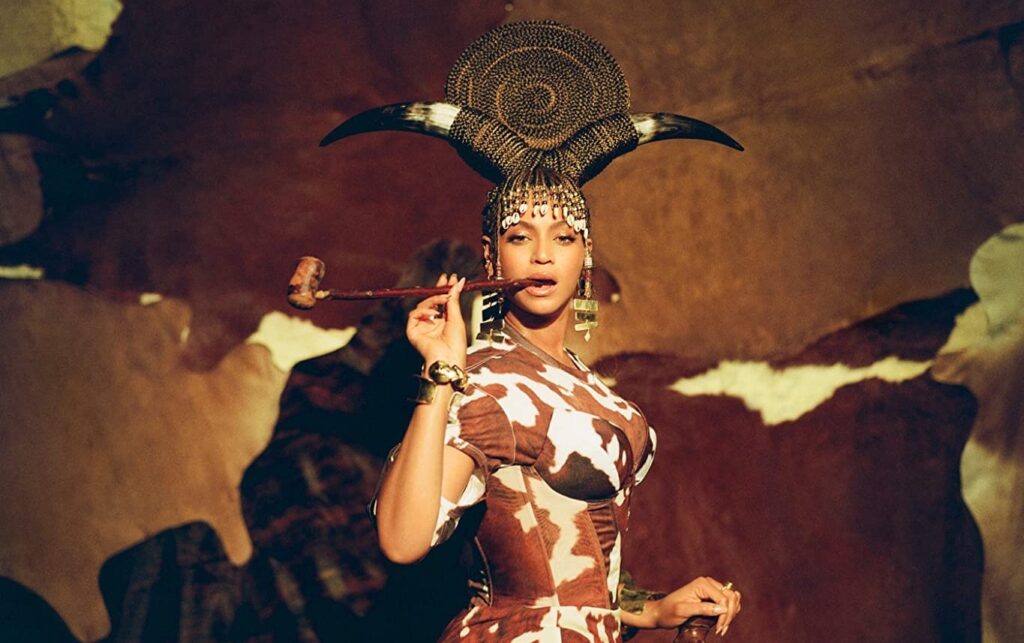Beyoncé Gives Us a Black, Queer, and Spiritual Renaissance
Through her music, tour, and videos, Beyoncé shares African spiritual traditions and Black culture with the world

(Illustration by Debora Cheyenne)
Beyoncé Giselle Knowles-Carter needs no introduction. Many fans and music afficionados alike agree that she is the best entertainer of her generation, and arguably among the best entertainers ever. Her stratospheric superstardom is so multi-layered that it supersedes what the world of entertainment has previously seen.
Her Renaissance album, tour, and now film are an homage to Black music, dance, and culture. As part of her tribute to disco and house music, she centers the creative contributions of Black and LGBTQ communities to these genres. Renaissance also give us glimpses into her personal spiritual practices, which she began offering in the visual albums Lemonade and Black Is King. Beyoncé leads us to a unique space where Black culture, history, and spiritualities intersect in a dizzying array of provocative lyrics and jaw-dropping performances.
However, Renaissance offers more than just entertainment. Through music and dance, Renaissance is doing the culture-shifting work of centering Black and queer communities that have been, and continue to be, harmed by whitewashing, marginalization, and discrimination.
Beyoncé achieves this liberating work in artistically unique ways while also standing her ground against many Christian detractors. Her Renaissance song “Church Girl,” for example, has raised the ire of many conservative Christians. She contrasts the conservative ideal of a “Godly Woman,” a woman who dresses modestly and follows her husband’s leadership, over against a self-empowered, body positive “bad girl” who feels free to dance, believe in herself, and speak her mind. Beyoncé is giving voice and permission to women who feel restricted by the church’s judgmental gaze. “Church Girl” has become an anthem to many Black Christian women and to the growing trend of Black women who are leaving Christianity and seeking out African-based spiritualities instead. This spiritual shift is an important phenomenon within African American Christianity on its own; as Beyoncé continues to share her own spiritual practices she adds to the visibility of this growing spiritual innovation.
The Beyoncé Bump
Yelp’s economics website Yelp Data, uses the term “Beyoncé bump” to refer to the increase in spending that local markets have experienced when her tour comes to town. In Philadelphia, for example, which hosted the beginning of the American leg of her tour in July 2023, Yelp reported a considerable increase in cash flow to restaurants, hotels, beauty services, and to small businesses owned by women, LGBTQ persons, and other minority owners as her fans intentionally searched out these businesses.
By the time the tour concluded in October 2023, it had earned $580 million, more than all of her previous concerts combined. Billboard reports that the tour sold 2.8 million tickets across 56 shows throughout North America and Europe.
Renaissance’s impact extends beyond economics. Renaissance pours libations to Black dance music and honors the legacies of earlier performers. In the album and on the tour, Beyoncé reminds the world that Black people created disco, house, funk, rock & roll, and the blues. She names iconic and historical figures of Black music throughout various songs. Even a casual listen to “Break My Soul” (The Queens Remix) gives the listener a bibliography of mostly Black women performers, including the “Godmother of Rock & Roll,” Sister Rosetta Tharpe. Tharpe is the blues/rock & roll guitarist who influenced the likes of Little Richard, Chuck Berry, and Elvis Presley. Her legacy became a casualty within a music industry that literally whitewashes people of color. Tharpe was a Black female gospel and rock & roll artist for whom the music industry had no place, leaving her to fall from communal memory. Beyoncé reclaims Tharpe’s place as an innovator, and rock & roll as Black music.
“Break My Soul” (The Queens Remix) continues the lyrical acknowledgment of more groundbreaking performers such as disco legends Donna Summer, Grace Jones (repeated for emphasis), “Empress of Blues” Bessie Smith, and jazz great Nina Simone. The roll call continues with Aaliyah, Solange Knowles (her sister and artist in her own right), Missy Elliot, Janet Jackson, Roberta Flack, Anita Baker, Diana Ross, Jill Scott a.k.a Jilly From Philly, Rihanna, Sade, Madonna, Whitney Houston, and Lauryn Hill. As a professor who teaches a course in Black Cultural Arts, I can say that Renaissance is a helpful teaching tool for Gen Z students who do not know the contributions of many of these artists. This song alone does the heavy lifting in a course designed to teach students about the trajectory of Black music from its roots in the blues to nearly every genre within contemporary American music.
Renaissance’s Queer Culture
“Bad Bitches To The Left…Money Bitches To The Right!” – “Pure/Honey,” Renaissance
Much of the music in Renaissance is rooted in the creative style and sounds of Ballroom culture. Ballroom, as depicted in the television show Pose and the 1990 documentary Paris Is Burning, features various “houses” of performers vying for the top spot in pageant like “drag balls.” For decades, Ballroom has provided safe creative venues by and for Black and Latinx LGBTQ folks.
In Renaissance, Beyoncé pays homage to the Ballroom tradition in the song “Heated” where she declares herself, “mother of my house” and calls out the well-established houses of Extravaganza, Balenciaga, Balmain, Ninja, Mugler, and Mizrahi. The lyric “Uncle Johnny Made My Dress…” loops through the background of “Heated” as a shout-out to her own uncle who made clothes and inspired Beyoncé by introducing her to the music and culture represented in the album. She notes on her website that he was her “Godmother.” Renaissance is dedicated to Uncle Johnny, the person who showed Beyoncé the ingenuity and creativity within the queer world of Ballroom and its fiercely competitive traditions of innovative fashion, dance and performance.
References to Ballroom extend through the tour. Concert performances include a catwalk and voguing. Beyoncé establishes an inclusive party vibe where everyone is welcome.

(Photo from a ballroom in New York City in 1998. Image by Catherine McGann for Getty Images.)
As part of its homage to Ballroom culture, Renaissance is a love letter to disco and house music, two sub-genres of Black funk and soul music, and an extension of Black dance and performance traditions. Renaissance re-centers all of these components within the realm of Black cultural production. House music, for example, first emerged within the context of urban, underground gay clubs in Chicago, New York, New Jersey, and Detroit in the late 1970s, most notably under the influence of iconic DJs Larry Levan and Frankie Knuckles. Many people within these communities had been ostracized from their homes, families, and churches, and sought to create new spaces where they could be free, safe, and accepted. Dance clubs became those places. As I’ve written elsewhere, clubs and dance floors became spiritual sanctuaries. Gospel House became a sub-genre of its own, serving as both resistance to religious exclusion and its own form of liberation theology in which LGBTQ people declared themselves loved and seen by God. In the wee hours between Saturday night and Sunday morning, club goers created their own spiritual revival through ecstatic dance to pulsating music. Renaissance is steeped in this culture. By featuring this music, Beyoncé tells the story of its creators, icons, innovators, and club goers. Those who were excluded now have the spotlight on Beyoncé’s stages. Those who may conflate house music with European electronic dance music are corrected with lessons in Black music and dance culture. Renaissance resists the whitewashing of Black music and dance and corrects the erasure of LGBTQ people.
“Beyoncé won’t save you!”
Beyoncé continues to be a target for many Black conservative, evangelical Christians who oppose her work. These Christians claim Beyoncé’s music is “Satanic,” that she is engaged in witchcraft, and that she encourages her followers to perform demonic rituals. They scrutinize her visual images, hand gestures, artistic productions, and song lyrics in search of evidence that she and her family (husband Jay-Z and sister Solange Knowles) are literally in league with the devil. One image from her album Black Is King, in which she wears a crown of horns, is particularly inflammatory. Some Christian critics take this imagery to suggest an alliance between Beyoncé and the pagan god, Baphomet. Conservative Christians continue to cite these images as proof of Beyoncé’s allegiance to the devil, despite Beyoncés overt attempts to correct this oversight by proclaiming her intention to channel Hathor, an African deity that pre-dates Baphomet and wears a crown of horns.

(Image from “Black is King”)
Ministers such as Bishop Patrick L.Wooden, Sr. use their pulpits to disparage Beyoncé and the Knowles-Carter family, vehemently discouraging their parishioners from listening to any of their music or attending their concerts. Wooden refers to the song “Church Girl” as “demonic trash and sacrilege.” Pastor Tiphani Montgomery went viral for reprimanding Christians who are Beyoncé fans, noting that Beyoncé is “a witch hosting large scale covens.” While these claims seem outrageous, there is a longstanding conspiracy theory that names Beyoncé and Jay-Z as members of the Illuminati, a secret society of the powerful elite, who demand sacrifices and loyalty in exchange for fame and wealth. Untimely celebrity deaths are often attributed to the Illuminati calling in a debt. While these conspiracies seem far-fetched, the stories are pervasive and somehow remain just under the surface of mainstream culture.
Among many problems with these accusations, they reveal people’s ignorance of the African spiritualities that Beyoncé references in her work. As I write elsewhere, the colonization and religious conversion of African peoples throughout the diaspora to conservative, evangelical Christianity has resulted in a wholesale rejection of African religions, viewed as illegitimate and demonic. Beyoncé offers another perspective on this topic by centering African culture and spirituality in Lemonade, Black Is King, and Renaissance.
Beyoncé educates audiences about African culture and spiritualities. In the album Black Is King, she centers the work of African designers, performers, and artists. The album is a retelling of The Lion King, and depicts a coming-of-age set of vignettes featuring a young African boy on his journey into self-knowledge and maturity. The entire project’s visuals present the beauty and contributions of African people; the music, imagery, clothing, and lyrics inspire conversation, debate, and education.
For many people, Africa remains captive to a dominant colonial narrative of an impoverished continent whose people are constantly in need of foreign protection and support. As such, the truth of Africa’s wealth, vast cultural diversity, far-reaching history, pre-colonial empires, and contemporary urban sophistication remain unknown to most of the world. Beyoncé is changing that narrative. Her album Lemonade gives audiences a peek into African cultural richness, including her own spiritual practices. The Lemonade song “Hold Up” offers several insights into her personal spiritual practices, including fasting, wearing white, abstaining from mirrors and sex, and being baptized in a river. Many of these rituals are part of ceremonial practices associated with the traditions of Ifa and Vodun. The video for “Hold Up” features Beyoncé walking through a rush of water in a yellow dress, reminiscent of the West African Orisha of rivers, streams, beauty, and fertility, Oshun. Likewise, the Black Is King song, “Black Parade,” references Oshun, ancestor veneration, and Beyoncé’s practice of charging her crystals in the moonlight.
Beyoncé’s music influences and reflects the already growing trend of African American women leaving Christianity to explore African spiritualities. Documentaries such as Ancestral Voices and news stories illuminate the phenomenon of those exploring the traditions of Ifa, Vodun, Lucumi, and Hoodoo. Where evangelical Christians continue to protest the re-emergence of interest in these practices, they are met with the resistance of African people throughout the diaspora seeking their roots and ancestral connections. Descendants of Africa throughout the world feel drawn to know themselves more fully and to find spiritual empowerment, and Beyoncé reflects and celebrates this deep connection to the continent.
***
The “bump” that Beyoncé gives to Black culture and spiritualities has yet to be fully seen. Scholars, writers, economists, artists, influencers, and religious leaders continue to watch, critique, and measure the effect of every project she takes on. Renaissance is not only an entertaining dance album, it IS a renaissance itself that recalls and showcases the contributions of legendary artists past and present. It functions as a historical and cultural gallery for Black and queer creativity to be remembered and acknowledged as the foundation of disco, house, and dance culture.
Black spiritualities are also prominently on display in this cultural renaissance. Beyoncé’s body of work pushes the boundaries of Christian theology, spurring theological reflection and discussions as her global audiences are introduced to diverse Black spiritualities beyond the monolithic, conservative Black Church by pointing toward a cosmos filled with African deities, ancestors, and rituals. In these ways, “the Beyoncé bump” includes a multi-faceted artistic renaissance that continues to lift our collective cultural competence long after the last dance. Because, as Beyoncé tells us herself, “the Renaissance is not over.”
Darnise C. Martin, Ph.D. is a lecturer in the African American Studies Department at Loyola Marymount University. She is the author of Beyond Christianity: African Americans in a New Thought Church.